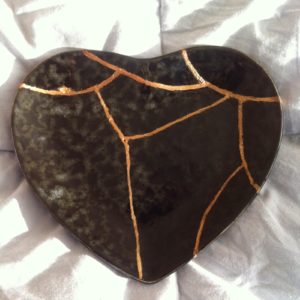They’ve experienced, endured, and survived a parent’s biggest fear and worst nightmare: having a child pass away. Devastated, shattered, and crushed, they somehow piece their hearts and lives back together – never moving on from their precious children but eventually moving forward with their lives, deeply impacted and changed people.
Over the years I’ve had the sacred privilege of learning from dozens of beautiful and strong souls who have had children pass away. As they say, it’s a club no one ever wants to be a part of, but the lessons they learn the excruciatingly hard way about life, death, living, and loving are powerful, profound, and priceless for everyone. Here are three lessons that have stuck with me that will no doubt stick with you too.
 1. If your child went missing, wouldn’t you go looking for them?
1. If your child went missing, wouldn’t you go looking for them?
One of the most simple yet profound statements came from Iris Misshula, whose daughter Dana passed away suddenly while jogging. Iris asks simply, “If one of your children went missing, wouldn’t you go looking for them? That’s exactly what I am doing with my child who passed away. I’m trying to find where she went and if she’s okay.”
Of course if any of our children went missing, we all would go on an exhaustive search for our child and wouldn’t stop until we found them. Similarly, parents who have had children pass away miss them dearly and desperately want to know where their child went and if they are okay. Yes, they realize all too well their children aren’t physically coming back, but they want to know if the spirit of their son or daughter lives on somewhere and if they are being cared for.
Many grieving parents understandably go on serious spiritual quests to “find” their children – voraciously reading books, watching videos, listening to podcasts, etc., that focus on the mystery of the Afterlife. Some turn to religious teachings about heaven, others seek out medium readings in an effort to reconnect with their children, and some turn to studying near-death experiences (NDEs) as ways to search for their children and find soul-satisfying answers. Learning from NDEs that although a person’s physical body dies, life indeed continues on and their children are safely on the Other Side cared for by deceased family members and friends provides some comfort during the difficult grieving process.
All of us, when faced with life-altering events and seemingly unanswerable questions, go on a deep search for meaningful answers at some point in our lives.
What answers are you searching for in your life right now and why?
Are you looking in the right places?
What resources can you turn to for solid and soul-satisfying answers?
Who best can support and guide you during your search?
 2. Major life transitions serve as a reset button that change a person’s values and trajectory.
2. Major life transitions serve as a reset button that change a person’s values and trajectory.
For many near-death experiencers, their life-changing visit to heaven acts as a reset button for their life. Most come to realize the trajectory they were on was either not mentally, physically, and/or spiritually healthy for them or was not aligned with their life’s purpose. The NDE often acts as a major reset button – significantly resetting their life, their values, their profession, and their purpose. The NDE serves as significant catalyst to reboot their lives and livelihoods into hopefully a higher version of themselves.
Bereaved parents also experience a major reset to their life. The unbelievably painful passing of a child forces them to take a hard look at their own lives. As they process the transition of their child and examine their own lives, their values often change, their appreciation for life changes, their tolerance for petty issues changes, their relationships change, and they change as people. As they reflect, recover, and rebuild, many undergo a slow but steady personal and spiritual metamorphosis; transitioning from someone who was caught up in the craziness and superficiality of day to day life to a much more enlightened soul who now recognizes the bigger picture and views things from a higher perspective.
Similarly, after a major upheaval and transition in our own lives, whether that is the loss of a parent or spouse, a serious disease diagnosis for ourselves or a loved one, a messy divorce, or a depressing downsizing, we too experience a kind of reset to how we see life, how we see ourselves, and how we do life. We question why it had to happen and we wonder how or if we will make it through this difficult change. We too find ourselves at a major crossroads in life and have a chance to reset and reboot…
What major transitions have you experienced in your life?
How did they reset you and your life’s trajectory?
How did your values and perspective change following the transition?
 3. Once your life is shattered, you decide which pieces to put back and which to discard.
3. Once your life is shattered, you decide which pieces to put back and which to discard.
The death of a child obviously shatters a parent’s heart and life into millions of pieces. Especially in the early stages of grief, oftentimes just being able to get out of bed at some point during the day for just a few minutes is considered a good day for most parents.
However, as bereaved parents look to eventually piece themselves and their lives back together, they come to an important and life-changing realization. As grieving parent Roseanne Chee, who lost her daughter Cassie, revealed: they get to decide which pieces to put back in their lives and which pieces to discard. They get to decide which attitudes, actions, people, relationships, etc., they want to preserve and cherish – and which ones they can shed and move beyond.
In fact, a perfect analogy involves the Japanese art of kintsugi (pictured above). Kintsugi artists take shattered and broken ceramics and reassemble them using a golden glue that mends and adorns the jagged cracks. The artists decide which pieces to keep as part of the new design and which ones to discard. In the end, they create a different design that oftentimes is much more valuable and beautiful than the original piece, scars and all.
Are you committed to building yourself and your life back together after experiencing life’s challenges that can shatter you and your world?
Which pieces of yourself and your life will you keep as you build back better, kinder, stronger?
Which pieces of yourself and your life will you discard moving forward?
Once you piece yourself back together, how can you help others who feel shattered?
Though they would never want you to join their ranks, bereaved parents can teach all of us so much. By enduring and surviving perhaps life’s greatest ordeal, they provide us all with a powerful pathway of hope and healing as we face our own challenges. Keep these three lessons in mind as you face major crises and transition points in your life.

